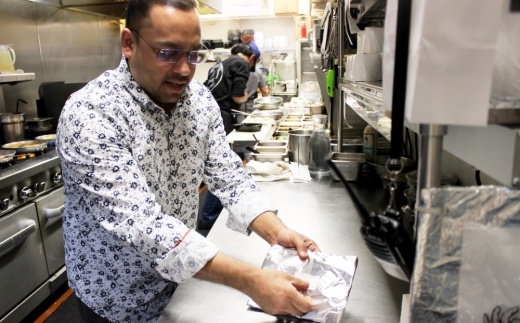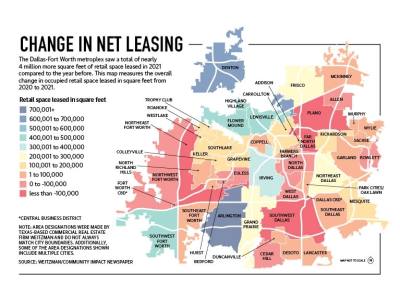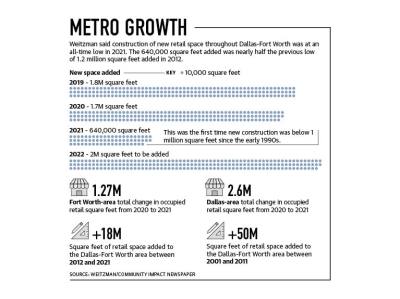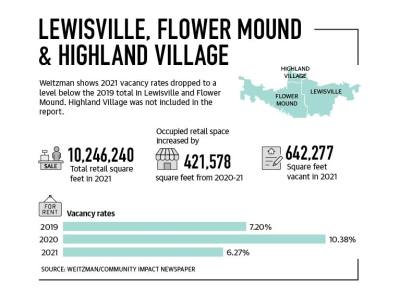Now, two years later, five new local shops have opened or will open in the shopping center in the coming year, with spaces for lease still up for grabs, The Shops General Manager Ravi Wadhwa said.
“We shifted toward local tenants. That was our strategy,” Wadhwa said. “We were able to get in more local tenants, and supporting locals is something our community appreciates and prioritizes.”
The shift comes as shopping patterns changed during the pandemic. National chains paused store openings, which made The Shops readjust their strategy, Wadhwa said. Tenants within The Shops also adjusted their means of work.
“Our restaurants during the pandemic had to make big changes,” he said. “They were able to pivot during COVID[-19], and they became the new anchors of the retail industry.”
For example, Delhi6 Indian Kitchen moved to takeout and delivery orders the first months of the pandemic. During that time, restaurant employees delivered meals and offered curbside service, Wadhwa said.
That service, Wadhwa said, built a loyal customer base, who now can dine at the restaurant.
Delhi6 Indian Kitchen owner AJ Jain, who owns the restaurant with his brother VJ Jain, attribute the success of their business to the support of the community, AJ Jain said.
“The community was very very important,” he said. “They kept us busy and gave us support and courage to stay open.”
The return to in-person shopping is something Texas-based commercial real estate firm Weitzman said is happening throughout the Dallas-Fort Worth metroplex.
“We’re in a much better place today [than March 2020],” Weitzman Executive Vice President Michelle Caplan said during the firm’s annual forecast that was livestreamed in January. “Everyone from retailers to landlords to shoppers ... have all faced enormous challenges with innovation and ingenuity. We’ve navigated risk and achieved one of the greatest market turnarounds ever.”
As part of its report, Weitzman noted construction of new retail space in the region was at an all-time low in 2021, with just 640,000 square feet of new space added. That was nearly half the previous record low of 1.2 million square feet built in 2012, according to Matthew Rosenfeld, Weitzman executive vice president and director of DFW brokerage. However, increased demand for retail space and rising occupancy rates are expected to help turn things around in 2022, according to the forecast.
“Based on what’s in the pipeline, we expect construction to total approximately 2 million square feet [in 2022],” Caplan said. “That’s more than double the 2021 total, but it remains on the conservative side.”
The Weitzman forecast also found retail occupancy was at 93.5% throughout the region at the end of 2021. That rate was the third highest total the firm has recorded for DFW, just below its previously recorded highs of nearly 94% in 2019 and almost 95% in 1981.
The firm’s data is based on more than 1,400 shopping centers totaling more than 200 million square feet of retail space across the metroplex. Weitzman’s forecast for this year expects retail occupancy to increase to 95%. The retail leasing market was also the third strongest the firm has seen in 22 years, according Rosenfeld.
“This is [a] complete reversal from 2020, when pandemic-related closures resulted in vacancy jumping by more than 4 million square feet,” Rosenfeld said at the January event. “Now, our numbers [going into 2022] look remarkably like those of pre-pandemic 2019—one of the best years ever for our retail market.”
Adapting locally
Lori Walker, the Flower Mound Chamber of Commerce president, said the pandemic has exacerbated issues, such as staffing shortages and supply chain concerns for local retailers.
“Everyone has a ‘help wanted’ sign that is hung,” Walker said. “We’re going to feel that issue, and it is across the board of every profession.”
The Flower Mound Chamber of Commerce has more than 600 members from businesses from Lewisville, Flower Mound, Highland Village and other surrounding cities.
Restaurants and retailers had to make major adjustments once people were sent home in the early days of the pandemic. Many of those changes have stayed two years later, Walker said.
Highland Village restaurant Bistecca shifted from a dine-in Italian steakhouse to offering a drive-thru curbside dining option, Walker said. The new options allowed the business to stay open.
As for the worker shortage, Walker said she suspects the need for employees is related to the access to more flexible work environments and schedules that have become available during the pandemic, including working from home.
That shift in work environments is also being incorporated into the design of new apartments and townhomes, according to Matt Enzler, a senior managing director with multifamily development company Trammell Crow Residential. The company has built multifamily developments in Plano, Richardson, Flower Mound, Fort Worth and other areas throughout the metroplex.
“We’re adding more home office-type options, whether it’s a full dedicated study or if it’s just adding a spot ... for a [personal] workspace,” Enzler said. “Then, outside the unit we’ve added, for all of our new developments, ... more workspace. You don’t necessarily want to live and work in the same spot 24 hours a day.”
While Trammell Crow was incorporating many of these options into designs even before the pandemic began, Enzler said the company has put more of an emphasis on these features, and he expects that will continue.
‘Tech and mortar’
Rosenfeld said grocery stores throughout the region have led the way in using digital tools to help physical retailers meet changing customer needs. That is an approach Weitzman refers to as “tech and mortar.”
“Without a doubt, COVID[-19] has transformed grocery shoppers’ behavior, and brick-and-mortar locations [that] are offering delivery and curbside pickup [are] benefiting,” Rosenfeld said.
The region is seeing expansions from grocers, including Kroger, Sprouts and H-E-B, according to the Weitzman forecast. H-E-B has announced plans to open new stores in Plano and Frisco in 2022 and McKinney in 2023.
The demand for Walmart’s pickup and delivery services has led the company to increase its order fulfillment capacity by 40% over the last two years, according to Lauren Willis, the retailer’s communications director for Texas.
“The pandemic permanently changed how customers shop,” she said via email.
To help meet customers’ new shopping patterns, Walmart is adding market fulfillment centers to many existing stores, including ones in Plano and Lewisville. These centers will help meet the demand for Walmart’s contactless pickup and delivery services in those cities and throughout the metroplex.
Looking ahead
Locally, businesses have continued to open like Flower Mound’s new meat market. Before the start of the COVID-19 pandemic, the Flurry family never anticipated opening their own meat market.
But when they did, they encountered a number of obstacles. Clayton and Katie Flurry opened Flurry’s Market + Provisions in December.
The Flower Mound business offers a range of meats along with a bistro and gift shop.
“Honestly, I don’t have a comparable [pre/during/post-pandemic measure] to know how different or not how things were for our experience,” Clayton Flurry said. “The two biggest issues we faced were shortages of mechanical engineers and equipment delays.”
One issue Flurry encountered was procuring equipment for refrigeration. Before the pandemic, such orders would take four to eight weeks, but when opening their store, it took six months, Flurry said.
“The whole supply chain was and is messed up,” he said. “We had to send someone from Flower Mound in a pickup truck to Michigan to pick up two sets of doors that the manufacturer couldn’t find a driver for.”
Despite the challenges, business is consistent and even busy, Flurry said.
“We tackled one challenge at a time. Some were too big for us and truly put us on our knees in prayer,” he said. “At the end of the day there is still a lot of common good in this world, and the old adage of, ‘Where there is a will there’s a way,’ still rings true.”









